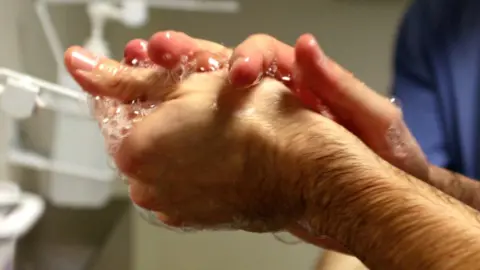Betsi Cadwaladr hospital infection rates 'too high'
 PA
PAMajor improvements are needed at north Wales' three main hospitals to reduce the risk of infection, a report has found.
Gill Harris, Betsi Cadwaladr University Health Board's (BCUHB) executive director of nursing and midwifery, said targets for 2016-17 were missed.
This was despite a 25% drop in Clostridium difficile (C. diff) cases and a 9% fall in MRSA cases.
The health board has hospitals in Wrexham, Bangor and Bodelwyddan.
In her report, Ms Harris said: "Rates of infection in BCUHB remain too high and the health board is committed to protecting people from infections.
"Improvements are needed across a wide range of key clinical practice standards, including the care of invasive devices and antimicrobial prescribing, and the focus of work within BCUHB is on these aspects of care."
Resignations
In 2013, Wales' largest health board, which cares for 694,000 people in north Wales, was severely criticised for how it handled an outbreak of C. diff after 30 patients died while suffering with the infection at Glan Clwyd Hospital in Bodelwyddan, Denbighshire.
The chief executive, chairman and vice-chairman later stood down.
Prof Brian Duerden, an expert in healthcare associated infection and antibiotic resistance, was commissioned to produce the report into the outbreak and was highly critical.
Improvements at BCUHB, whose hospitals include Wrexham Maelor, Bangor's Ysbyty Gwynedd and Glan Clwyd, were last year said to be "very significant".
The health board has been only one in Wales in special measures for the last two years.
BCUHB will discuss what more needs to be done when it meets on Thursday.
